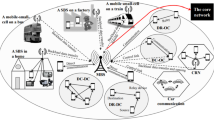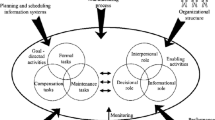Abstract
The problem of optimally controlling the processing rate of tasks in Discrete Event Systems with hard real-time constraints has been addressed in prior work under the assumption that a feasible solution exists. Since this cannot generally be the case, we introduce in this paper an admission control scheme in which some tasks are removed with the objective of maximizing the number of remaining tasks which are all guaranteed feasibility. We derive several optimality properties based on which we develop a computationally efficient algorithm for solving this admission control problem under certain conditions. Moreover, when no future task information is available, we derive necessary and sufficient conditions under which idling is optimal and define a metric for evaluating when and how long it is optimal to idle. Numerical examples are included to illustrate our results.






Similar content being viewed by others
References
Aydin H, Melhem R, Mossé D, Mejia-Alvarez P (2004) Power-aware scheduling for periodic real-time tasks. IEEE Trans Comput 53(5):584–600, May
Buttazzo GC (1997) Hard real-time computing systems: predictable scheduling algorithms and applications. Kluwer, Norwell
Chetto H, Chetto M (1989) Some results of the earliest deadline scheduling algorithm. IEEE Trans Software Eng 15(10):1261–1269
Dauzère-Pérès S, Sevaux M (2002) Using lagrangean relaxation to minimize the weighted number of late jobs on a single machine. Nav Res Logist 50(3):273–288
Dauzère-Pérès S, Sevaux M (2004) An exact method to minimize the number of tardy jobs in single machine scheduling. J Sched 7(6):405–420
Gamal AE, Nair C, Prabhakar B, Uysal-Biyikoglu E, Zahedi S (2002) Energy-efficient scheduling of packet transmissions over wireless networks. In: Proceedings of IEEE INFOCOM, vol 3, 23–27. IEEE, New York, pp 1773–1782
Jeffay K, Stanat DF, Martel CU (1991) On non-preemptive scheduling of periodic and sporadic tasks. In: Proc. of the IEEE real-time systems symposium. IEEE, Piscataway, pp 129–139
Jonsson J, Lonn H, Shin KG (1999) Non-preemptive scheduling of real-time threads on multi-level-context architectures. In: Proceedings of the IEEE workshop on parallel and distributed real-time dystems, vol 1586. Springer, Berlin, pp 363–374
Kise H, Ibaraki T, Mine H (1978) A solvable case of the one-machine scheduling problem with ready and due times. Oper Res 26(1):121–126
Lenstra JK, Rinnooy Kan AHG, Brucker P (1977) Complexity of machine scheduling problems. Ann Discrete Math 1:343–362
Liu JWS (2000) Real-time systems. Prentice Hall, Englewood Cliffs
Mao J, Cassandras CG (2006) Optimal control of multi-stage discrete event systems with real-time constraints. In: Proc. of 45rd IEEE conf. decision and control. IEEE, Piscataway, pp 1057–1062 (subm. to IEEE Trans. on Automatic Control, 2007)
Mao J, Cassandras CG (2007) Optimal admission control of discrete event systems with real-time constraints. In: Proc. of 46rd IEEE conf. decision and control. IEEE, Piscataway
Mao J, Cassandras CG, Zhao QC (2007) Optimal dynamic voltage scaling in power-limited systems with real-time constraints. IEEE Trans Mobile Comput 6(6):678–688, June
Miao L, Cassandras CG (2006) Optimal transmission scheduling for energy-efficient wireless networks. In: Proceedings of INFOCOM. IEEE, Piscataway
Moore JM (1968) A n job, one machine sequencing algorithm for minimizing the number of late jobs. Manag Sci 15(1):102–109
Pepyne DL, Cassandras CG (2000) Optimal control of hybrid systems in manufacturing. In: Proceedings of the IEEE, vol 88. IEEE, Piscataway, pp 1108–1123
Schwan K, Zhou H (1992) Dynamic scheduling of hard real-time tasks and real-time threads. IEEE Trans Softw Eng 18(8):736–748
Silly M, Chetto H, Elyounsi N (1990) An optimal algorithm guaranteeing sporadic tasks in hard real-time systems. In: Proceedings of the 2nd IEEE symposium on parallel and distributed processing. IEEE, Piscataway, pp 578–585
Tia T, Liu W, Sun J, Ha R (1994) A linear-time optimal acceptance test for scheduling of hard real-time tasks. Preprint, Dept. of Computer Science, Univ. of Illinois at Urbana-Champaign
Yao F, Demers A, Shenker S (1995) A scheduling model for reduced cpu energy. In: Proceedings of the 36th Annual symposium on foundations of computer science (FOCS’95). IEEE Computer Society, Los Alamitos, pp 374–382
Author information
Authors and Affiliations
Corresponding author
Additional information
The authors’ work is supported in part by the National Science Foundation under Grants DMI-0330171 and EFRI-0735974, by AFOSR under grants FA9550-04-1-0133 and FA9550-04-1-0208, and by DOE under grant DE-FG52-06NA27490.
Rights and permissions
About this article
Cite this article
Mao, J., Cassandras, C.G. Optimal Admission Control of Discrete Event Systems with Real-Time Constraints. Discrete Event Dyn Syst 20, 37–62 (2010). https://doi.org/10.1007/s10626-008-0052-5
Received:
Accepted:
Published:
Issue Date:
DOI: https://doi.org/10.1007/s10626-008-0052-5




